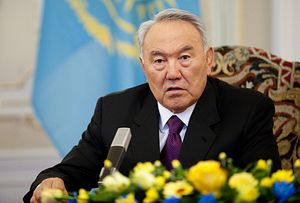After a dramatic announcement, the channels KTK and Khabar aired an hour-long interview with Kazakhstan’s president Nursultan Nazarbayev last week. Nazarbayev spoke at length and was only interrupted by short questions and clips of his past speeches. The title of the talk made it all very personal: “With Nazarbayev, about the chief [issues]” (S Nazarbayevym o glavnom) was the quirky headline, a clear play on words between what and who is more important. Starting from the hard days of the 1990s, the interview went on to praise the president’s foresight, drawing parallels between then and now with reference to the economic crisis, the Eurasian idea, and the fight against corruption. Most importantly, Nazarbayev used the occasion to put his latest policies in perspective for his fellow citizens, something that was much needed after he repeatedly appeared on TV in the past months announcing new reforms and state programs.
The interviewer, Yerlan Bekkhozhin, is the director of the presidential telecommunication services TRK, a state-funded corporation. Unsurprisingly, Bekkhozhin served some softball questions to the president, who was quicker than his interlocutor in veering towards thorny issues, like language politics, corruption, and the current crisis. So little is known about Kazakhstan’s backstage politics in the past 25 years that Nazarbayev can lightheartedly joke about one of his first trips to the U.S.: “The early 90s were really disastrous years […] we found ourselves in such poor conditions” the president said, “I couldn’t dissimulate this with everyone of course, but [foreigners] believed in me as there was no-one else to trust. So, of course I bluffed.”
One of the main topics about Nazarbayev’s experience at the helm was the language policy. Having the official languages be both Kazakh and Russian, according to the president, was “what set us apart from the rest of the CIS.” “Pragmatism is what makes the difference. A politician needs to be grounded in reality to make the right decisions,” he opened. “We in Kazakhstan lived together, our popular memory and even our mindsets are identical […] the decisions that I made were probably not seen as well in northern Kazakhstan or in Mangistau, but it’s true that every Kazakh used the Russian language since the Tsarist era. It would have been senseless to say: ‘Now we only speak one language and if you don’t know Kazakh language, you are barred from civil service!’ What would have been the consequences?” Nazarbayev then turned directly to his interviewer and asked: “What if you were forced to speak, say, Chinese by tomorrow. Would you manage?” A nervous, silent nodding followed, allowing Nazarbayev to conclude his self-praise of his policy: “I stand by my earlier decision, because we shouldn’t offend those who try to build their own happiness, nor put nationalities against each other. That has a different name: nationalism. And when nationalism arises, fascism ensues.”
Another thorny issue brought up during the interview was corruption. Nazarbayev brought up the paragons of his fight against corruption, Singapore and Malaysia. “Corruption is a legacy of the Soviet state apparatus” said Nazarbayev. According to the president, every country fights corruption, but the scale of the problem is probably bigger in the countries of the post-Soviet space. Nazarbayev regards Kazakhstan as different: “[former Prime Minister of Singapore] Lee Kuan Yew said I jailed my own friend. But why did people forget that I jailed the father of my own grandchildren?” The reference is of course to Rakhat Aliyev, who was married to Dariga Nazarbayeva until he fell from grace and was accused of the murder of two bankers in 2007. Nazarbayev wanted to make a point: “I was worried when this case came to me, but I didn’t stop for the sake of kinship” said Nazarbayev, “because there are no untouchables in Kazakhstan.” This has been true for the cases of the governors of Pavlodar, Atyrau, and Karaganda, various ministers and, lately, of the managing director of the EXPO-2017 project, which was a “very bitter pill to swallow” for Nazarbayev. “There will be no roof in Kazakhstan” said Nazarbayev, referring to the common Russian metaphor for protectors.
Nazarbayev also spoke about the transition of power from the president to the parliament. Speaking of power relations since the 1990s, he said: “Presidential power didn’t oppress the people, but worked for the people. We needed a top-down power for all these years. Would anyone here in Kazakhstan have preferred to be in Ukraine, Georgia or Moldova instead? Those are all examples of post-Soviet parliamentary democracies.” Nazarbayev then proceeded with the objectives of Kazakhstan: “We will reach the American model, but for that we need time. Of what time am I talking? The middle class in Kazakhstan should contribute to more than 50 percent of our country’s production.” This is the fundamental condition for stability, according to the president. The process of transition of power will be carried out over the period 2016-2019: “First, already next year, all regional and local governors will be elected by the people,” Nazarbayev said. “Second, we will decentralize power to local authorities so that the ministries will have to cope only with large-scale, nation-wide issues.”
These three components of Nazarbayev’s interview define the president’s relationship with the state and its citizens. The summary of Nazarbayev’s presidential experience was prepared to celebrate his 75th birthday. After his speech last March, this seems to be another step towards a farewell. To conclude the interview, Nazarbayev hinted at his endurance: “As long as energy is burning within you, you can stay on earth. I still have it. My generation’s deeds will be remembered, because we are leaving a strong country for the future generations.” Nazarbayev’s political testament has already aired. But do not expect a “lame duck” kind of rule going forward. Nazarbayev wants to continue reaching milestones to replenish the record of achievements of “the First President,” as monuments in Kazakhstan already refer to him.

































